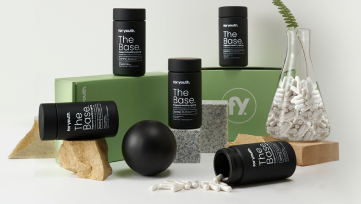The Heart-Healthy Benefits Of Red Wine And Resveratrol


 Shop our Resveratrol
Shop our Resveratrol 
Red wine has long been associated with potential heart-healthy benefits due to its rich content of antioxidants and polyphenols, particularly resveratrol. Resveratrol is believed to protect the heart’s blood vessels by preventing damage, reducing LDL cholesterol levels, and preventing blood clots.
However, studies on the effects of resveratrol on heart health have yielded mixed results, and the benefits of consuming resveratrol through foods other than red wine are not well understood. While red wine contains more resveratrol than white wine, it can also be found in grapes, grape juice, peanuts, blueberries, and cranberries.
Given the complex nature of resveratrol’s impact on health, it’s essential to delve deeper into its benefits and potential risks. On ForYouth, you can find a comprehensive guide on resveratrol, exploring its sources and how it impacts health. One critical aspect is its potential use in improving gut health and its ability to support blood pressure. Research furthermore points to the anti-inflammatory power of resveratrol and its role in cancer prevention. Moreover, it’s promising to find scientists like David Sinclair discussing its anti-aging benefits. You also don’t want to miss out on learning about the comparison between Trans-Resveratrol and Resveratrol and the difference between NMN and Resveratrol.
Additionally, the efficacy and potential side effects of resveratrol supplements remain uncertain. It is important to note that the American Heart Association and National Heart, Lung, and Blood Institute do not recommend initiating alcohol consumption solely for heart disease prevention.
From the perspective of diabetes management, resveratrol’s health benefits take on an even greater significance. Predominantly, resveratrol is known for its potential in aiding the enhancement of insulin sensitivity alongside the reduction of oxidative stress, crucial in curbing diabetes. Paired with the overarching power of resveratrol in promoting overall health, this multi-faceted antioxidant is indeed revealing impressive potential. Understanding the relationship between resveratrol and diseases, such as diabetes and cardiovascular diseases, provides valuable insight into reaching for a healthier lifestyle. However, always ensure to balance intake, consider potential side effects, and consult with a medical expert when necessary, particularly concerning alcohol consumption for resveratrol intake.
By signing up, you consent to receive For Youth emails
Get The Latest On Longevity Delivered To Your Inbox.
Instead, it is crucial to engage in a comprehensive approach to heart health that includes healthy lifestyle choices and to consult with a healthcare provider regarding the risks and benefits of alcohol consumption.
Key Takeaways

- Red wine in moderation is considered heart-healthy due to the antioxidants and polyphenols it contains.
- Resveratrol found in red wine can help protect blood vessels, reduce LDL cholesterol, and prevent blood clots.
- The effects of resveratrol on heart health are still uncertain and studies have produced mixed results.
- It is important to consume alcohol, including red wine, in moderation and to consider overall healthy lifestyle choices for heart health.
What does it do?
Resveratrol, a compound found in red wine, has been suggested to have various potential benefits for heart health. Some studies have shown that resveratrol can prevent damage to blood vessels by reducing oxidative stress and inflammation. It has also been found to reduce LDL cholesterol levels, which can help prevent plaque buildup in the arteries. Additionally, resveratrol has been shown to inhibit the formation of blood clots, which can reduce the risk of heart attacks and strokes. However, the evidence from studies on its effects remains mixed. It is important to note that the studies on resveratrol’s effects on heart health have yielded inconsistent results, and more research is needed to fully understand its potential benefits.
Potential Benefits

 Shop our Resveratrol
Shop our Resveratrol 
Studies have shown that the consumption of a specific compound found in certain types of alcoholic beverages has been associated with potentially positive effects on cardiovascular health.
The compound in question is resveratrol, which is found in red wine. Resveratrol has been the subject of numerous studies investigating its potential benefits for heart health. Some research suggests that resveratrol can help prevent damage to blood vessels, reduce LDL cholesterol levels, and prevent blood clot formation. These effects may contribute to a reduced risk of heart disease.
However, it is important to note that the findings on resveratrol’s effects on heart health are mixed, and more research is needed to fully understand its potential benefits. Additionally, it is unclear whether consuming grapes or other foods containing resveratrol provides the same benefits as drinking red wine.
Therefore, while red wine and resveratrol may have potential heart-healthy benefits, it is important to consider other lifestyle factors and consult with a healthcare provider before making any changes to one’s diet or alcohol consumption habits.
Discover The Grape – Resveratrol by For Youth

Learn more about The Grape – Resveratrol Singapore
Scientifically supported as an anti-aging supplement, resveratrol is a naturally occurring compound found in grape skin that offers numerous health benefits. Activating longevity genes helps protect your cells and contributes to a longer, healthier life. Our 99% pure resveratrol formula also boosts energy levels, provides antioxidant support, promotes cardiovascular health, and assists in addressing other aging-related issues.
Energy Enhancement:
Resveratrol mimics the effects of calorie restriction, activating genes called sirtuins that protect DNA and influence epigenetics. When combined with NAD+ boosters like NMN, which fuel these sirtuins, resveratrol works synergistically to increase your energy levels.
Antioxidant Properties:
As a potent polyphenol and natural antioxidant, resveratrol is found in high concentrations in grape skin, peanuts, berries, and Japanese knotweed (Hu Zhang). Antioxidants help protect your cells from free radicals that may lead to diseases.
Aging-Related Benefits:
Resveratrol offers a wide array of longevity advantages, including improved cardiovascular health, reduced inflammation, decreased bad cholesterol levels, enhanced skin health, and support for brain function, among other aging-related issues.
Recommended Consumption Limits
The recommended limits for alcohol consumption are up to one drink a day for women of all ages, for men older than 65, and up to two drinks a day for men aged 65 and younger. It is important to note that a drink is defined as 12 ounces of beer, 5 ounces of wine, or 1.5 ounces of 80-proof distilled spirits. These limits are set to ensure moderate alcohol consumption, which has been associated with certain heart-healthy benefits. However, it is crucial to understand that excessive alcohol consumption can lead to various health problems, including accidents, certain types of cancer, heart failure, high blood pressure, and liver and pancreas diseases.
Frequently Asked Questions
Can red wine or resveratrol supplements prevent heart disease?
There is mixed evidence on whether red wine or resveratrol supplements can prevent heart disease. While red wine contains antioxidants and resveratrol, which may protect the heart’s blood vessels, more research is needed to determine their effectiveness.
Does the amount of resveratrol in red wine vary depending on the brand or type?
The amount of resveratrol in red wine may vary depending on the brand or type. However, further research is needed to determine the specific variations in resveratrol content among different red wines.
Are there any risks or side effects associated with consuming red wine or resveratrol supplements?
Consuming red wine in moderation is generally considered safe and may have heart-healthy benefits. However, excessive alcohol consumption can lead to various health problems. The effectiveness and side effects of resveratrol supplements are uncertain.
Can red wine or resveratrol help with weight loss or obesity-related heart problems?
Red wine and resveratrol have not been proven to help with weight loss or obesity-related heart problems. While moderate red wine consumption may have some benefits for heart health, overall healthy lifestyle choices are more important. Further research is needed.
Is there a specific time of day that is best for consuming red wine for heart health benefits?
There is no specific time of day that is best for consuming red wine for heart health benefits. It is recommended to consume red wine in moderation as part of an overall healthy lifestyle for heart health.
Conclusion
→ The article provides an informative overview of resveratrol, a compound found in red wine and certain foods, that offers potential benefits for heart health, including protecting blood vessels, reducing LDL cholesterol, and preventing blood clots. However, the studies on resveratrol’s impact on heart health have yielded mixed results, and the effects of consuming resveratrol through alternate sources apart from red wine aren’t fully understood. The recommended alcohol consumption limits for potential heart-healthy benefits should not be exceeded, and a comprehensive approach involving overall healthy lifestyle choices is crucial for heart health.
→ The Grape – Resveratrol by For Youth, a product presented in this article, is a resveratrol supplement that promotes a variety of health benefits. These include anti-aging properties, enhancing energy levels, offering antioxidant support, promoting cardiovascular health, and addressing other aging-related issues. However, while there is scientific support for the benefits of resveratrol, the efficacy and potential side effects of supplements like these must be carefully researched and considered in consultation with a healthcare provider. Similarly, while red wine in moderation might offer heart-health benefits due to its resveratrol content, overall lifestyle choices and moderation in alcohol consumption remain paramount.








